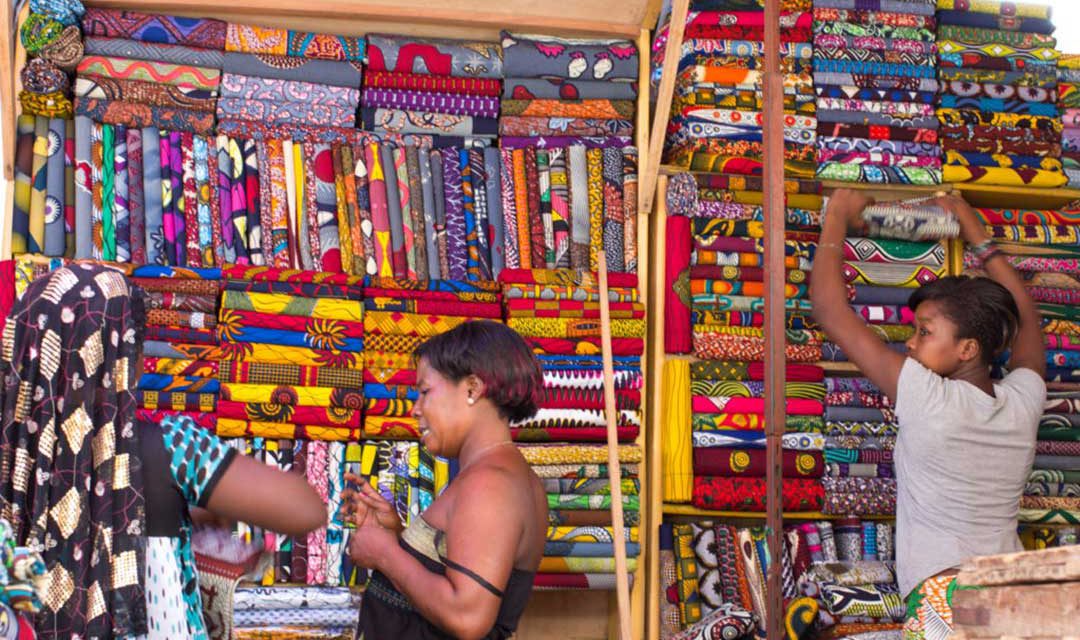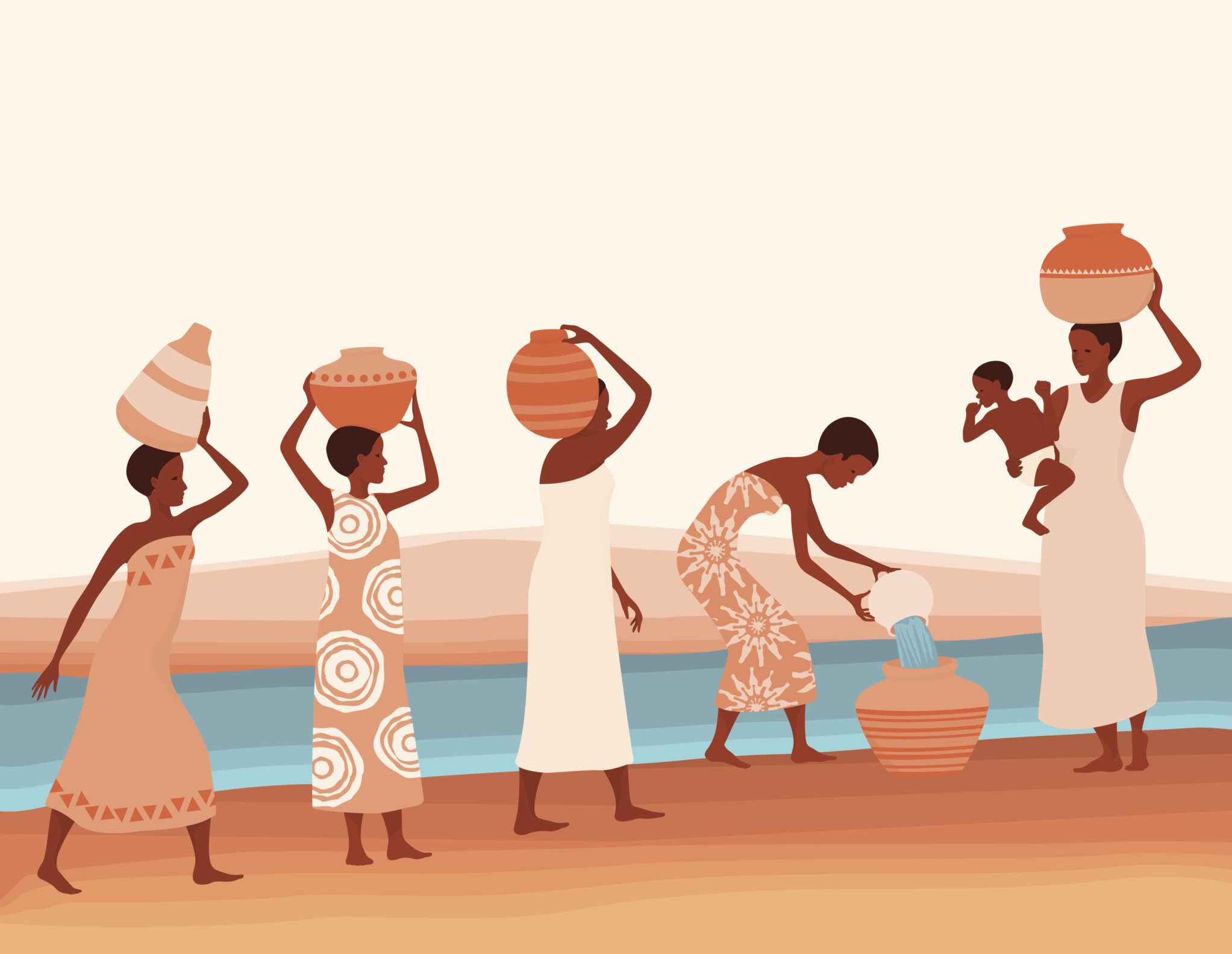Togo’s famous textile traders amassed fortunes and have played a major role in the country’s economy, but things have changed
Togo’s legendary women captains of the textile industry, known as Nana Benz, first became famous in the mid-20th century for the fortunes they amassed selling imported African textiles, including the famous “wax” cloth from Holland, and wrapper cloths. These stalwarts of Togo’s textile industry, through hard work and determination, have played a major role in the country’s economy.
The celebrated Nana Benz earned their name by being the first people in the country who could afford to import luxury Mercedes Benz cars into Togo. No official figures are available for levels of earnings of the Nana Benz at the height of their success but an indication of how influential they were, particularly between 1970 and 2000, is the fact that the state would rent their luxury cars whenever the country hosted an international event.
According to the last census carried out in November 2010, Togolese women represent over 52% of the population, estimated at 6.2 million people, and contribute 29% of the national wealth. In all, more than 50,000 small-scale women traders are involved in the local sale of African textiles, and the capital, Lomé, alone boasts about 800 textiles traders.
Today, however, following many challenges such as currency depreciation and the economic crises of the 90s that sent the price of imported African textiles skyrocketing, as well as foreign competition from the Far East, the legendary Nana Benz appear to be threatened with extinction. “I remember the old days when we used to travel to the Netherlands with our own designs every semester to get our products ready to be sold to our customers across Africa,” recalls Dédé Rose Creppy, one of the pioneers in the sector. “Although, at the beginning, only a few of us could afford to do that.”
According to the finance ministry, the Nana Benz textile trade contributed 8.3% of Togo’s GDP from 2008 to 2012. And while the glory days of the Nana Benz are over, a new generation of Nana Benz, affectionately nicknamed “Nanettes”, are looking at innovative ways to carry on and reinvigorate their mothers’ legacy.
Many of the original Nana Benz used their fortunes to acquire property portfolios abroad, but they also ensured their children, including their daughters, received the best education possible at western schools and universities. Togo’s high unemployment rates have also meant that working for their mothers and inheriting the family business has been the only viable option for some women returning home after completing their studies at overseas universities.
And so a new generation of textile entrepreneurs has emerged, armed with university degrees, alive to the challenges of a changed business environment but also aware of the potential offered by social media and new ways of marketing themselves. The winds of political change that have swept across Togo since the death of the late president, Gnassingbé Eyadéma, in February 2005, also appear to have inspired the new generation of Nanettes.
“There is a need for a change in mentality to start new businesses, but we also need to make it easier for businesses to pass from one generation to the next,” says Evelyne Dede Trenou, secretary of the professional textile traders union of Togo, l’Associationprofessionnelle des revendeuses de tissus (APRT). After completing her marketing studies in France, Trenou decided to take over from her late mother, considered to be one of the pioneers of Togo’s textile sector. “Our skills acquired in western universities are helping us to get a grip on the business despite the high levels of competitiveness. We can easily manage technical and administrative issues,” she says.
Sociologist Lawson Anani agrees that the daughters of the original Nana Benz are better equipped to handle greater competition in the textile industry. “Most of the pioneers of the sector were not graduates from universities or colleges, but they had entrepreneurial skills,” Anani says. “But understanding the [new] competitiveness in the sector, they have preferred to hand over their businesses to their daughters, who are well-equipped with their educational backgrounds to face any odds.”
Amélie Johnson is the third generation Nana Benz in her family. After completing her business administration degree, she did not hesitate to take over from her mother. Watching the beehive of potential buyers invading her shop at the Assigame central market – famous for its African textiles, though badly damaged by fire in 2012 – Johnson says it was an honour for her to make sure that their family business did not collapse. “We were many in the family, but I decided to do it because I have all the assets to make the business prosper,” she says proudly sitting in front of a pile of African textiles displayed in the shop.
The “Nanettes” are eager to defy the odds and use their entrepreneurial skills to recapture the success stories of their mothers. “We cannot allow this success story to end. We face many obstacles, but the new generation will bounce back in the coming years,” says Sepopo Lawson, a descendant of ManaviSewoaAhiankpor, alias Kpenkpen, another pioneer of Togo’s textile industry. Also known as Manatex – a reference to the name of her imported brand – Lawson took her grandmother’s place in the business after completing her studies in Europe. To memorialise her forebears’ achievements, she has set up a gallery dedicated to the success stories of the textile pioneers.
Recent trade and tax reforms aimed at facilitating trade and opening Togo’s markets to foreign competitors have, however, put pressure on textile entrepreneurs like Lawson, who have found themselves up against counterfeit products and a flood of low-cost Chinese products. Incomes have fallen.
“Chinese wholesalers have invaded the market with imported counterfeit traditional designs; it is killing our businesses,” complains textile trader Edwige Atayi. “The authorities must find ways to protect this sector, which contributes to reducing unemployment and growth creation in the country. There must be rules to protect our designs – they are our intellectual property.”
This will be difficult, because Togolese authorities prefer to maintain increasingly dynamic trade exchanges with China. “It is true that their [textile] businesses are negatively impacted by the invasion of the market by counterfeit Chinese products, but that is the price to pay in this world of globalisation,” acknowledged an official at the ministry of trade. However, he also explained that some incentives, including an 8% reduction in VAT on fabric, and 1% reduction on corporate tax, had been put in place to reduce the burden on the Nana Benz and boost growth in the textile sector.
It is widely agreed among Togo’s policymakers and the business community that opening up the domestic market to Chinese products is slowing down the textile sector’s contribution to the country’s economy. Nevertheless, many economists believe it is the price the country needs to pay to support economic openness. “No one can deny the importance of these women entrepreneurs to Togo’s economy,” economist De Souza Léon says. “But the authorities chose to sacrifice this on the altar of economic openness.”
In February 2018, China signed another economic agreement with Togo estimated to be worth about 8.5 billion CFA francs (about $14.8m). “Exchanges between the two countries are rich and diverse and the number of Chinese coming to Togo to visit or trade is growing,” said China’s ambassador to Togo, Liu Yuxi, at his country’s independence celebration in the country in 2014. According to the Chinese embassy, trade between Togo and China is worth about $2 billion each year.
Togo’s women entrepreneurs have also highlighted as a further hindrance to their businesses the exponential tax increases since the Togolese office of revenue (OTR) was launched in 2013, which has brought together the financial governance of customs and taxes. According to OTR, tax revenue collection increased from 516.3 billion FCFA (about $900 million) in 2015 to 578 billion FCFA (about $1 billion) in 2016. In 2017 this figure was 600 billion FCFA (about $1.04 billion).
“We must urgently consolidate the business environment in Togo,” Trenou says. “Though liberalised, it is not at all regulated. Government pledges in that respect have not been enacted – Indians, Lebanese and Sahelians have almost replaced the Nana Benz as big importers. The state should prevent big foreign importers from also selling retail.” In the meantime, the new textile amazons are leaving no stone unturned in revamping the sector, including the introduction of new technologies, which have helped to increase turnover in the past five years, despite the invasion of counterfeit Chinese products. For most of those mastering new technology, the time has come to capture new, niche customers.
“You can see that the new generation is bringing in new ideas,” says Maureen Ayité, who uses social media to reach new markets, even outside Togo. “The young Nana Benz are using new technologies to access the market. “We are starting to realise the benefits of ICT. For instance, I have begun to search for new markets for my newly introduced brand. Last year, some customers came from Ivory Coast after seeing some of my designs via WhatsApp and Facebook. This has helped to increase my income by 5%.”
Ayité and her peers believe that if the technological revolution succeeds, spin-off effects will help re-energise the ailing African textiles industry not only in Togo but in Ghana, Benin, Cote d’Ivoire and Nigeria. Meanwhile, Trenou’s textile traders union has started a training campaign for members to raise awareness around the benefits of ICT in developing the textile industry.
“The Internet has become a cheap and effective means of exchanging information on and the marketing of African business, including for selling distinctive products like African textiles abroad. So the young generation must be taught how best to use ICT efficiently to compete with foreign products like Chinese counterfeit textiles,” said Trenou.
No figures are available for the annual income generated by the textile traders, but a trade ministry official estimated that the sector’s annual income in 2017 could be about 2 billion FCFA (about $3.5 million). In the meantime, the Nanettes continue to look at innovative ways of maintaining their businesses, including diversifying with investments in the real estate and hospitality sectors.
Blame Ekoué is the Togo correspondent for the BBC and for Paris-based media house, ANA. He has also reported for Associated Press and Radio France International. He holds a BA in Communications from the Leader Institute in Lomé. Formerly deputy editor of the West Africa Revue, he has been a contributor to the Lome-based Business and Finance magazine since 2015.













